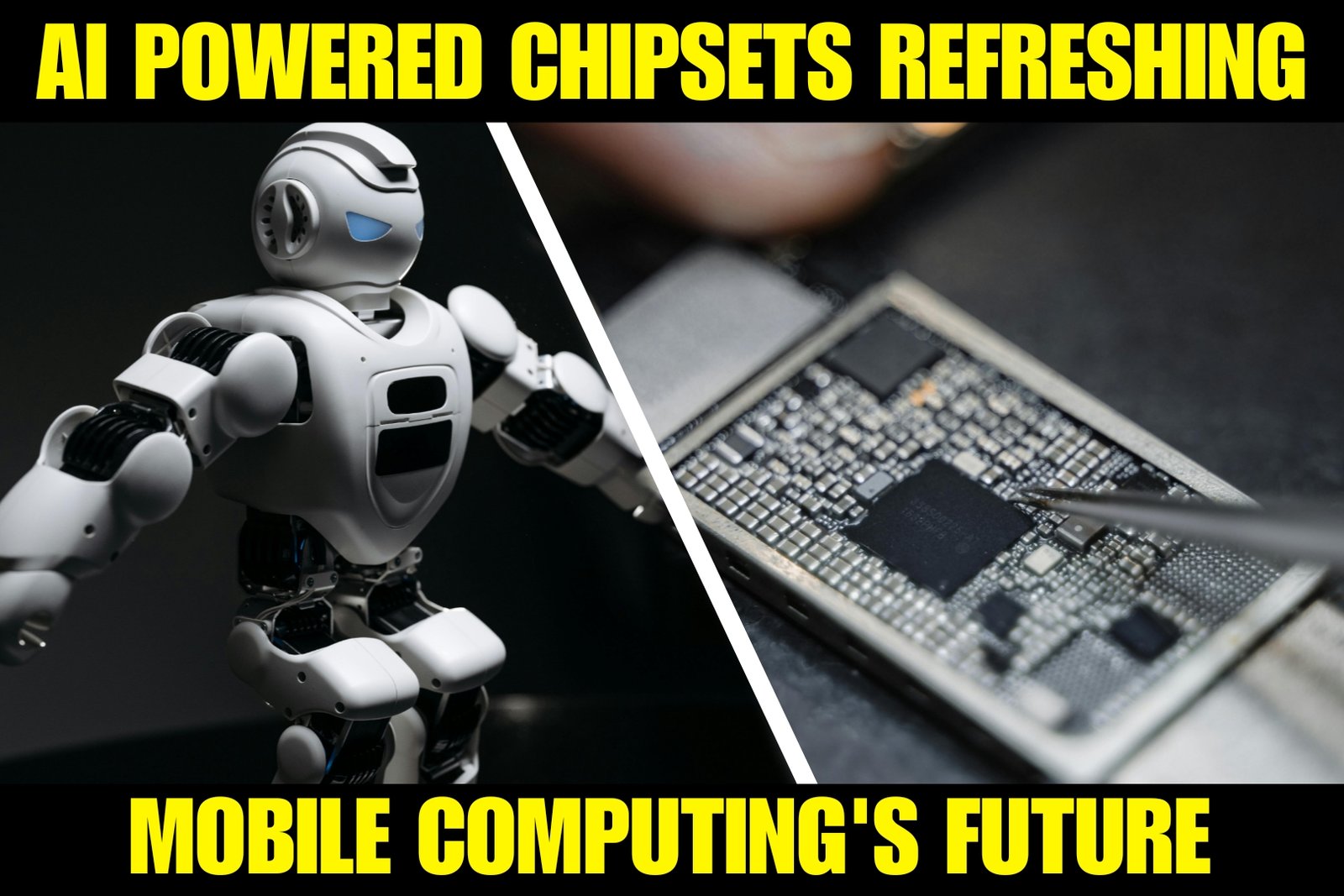Particularly in the field of mobile computing, the junction of artificial intelligence (AI) with hardware development has become one of the most transforming themes in technology. The most recent developments in AI-powered chipsets are fast altering the performance of mobile devices, thereby transforming them into smarter, more efficient, and better suited to manage challenging jobs. Leading innovators in mobile performance, battery life, and user experience, companies including Apple, Qualcomm, and Google are front and foremost in embedding artificial intelligence into their chipsets.
Why AI-Powered Chipsets Matter
Designed to manage artificial intelligence and machine learning chores more effectively than conventional CPUs and GPUs, AI-powered chipsets are specialist processors. Faster and more intelligibly processing data, these chips allow smartphones to handle activities including augmented reality (AR), speech recognition, real-time language translating, and computational photography with better accuracy and speed.
1. improved performance :
By outsourcing demanding activities to the AI processor, artificial intelligence chipsets improve mobile device performance generally. For instance, Qualcomm’s Snapdragon CPUs feature a built-in artificial intelligence engine that manages task prioritizing depending on real-time usage and power allocation, hence optimizing the phone’s performance.
2. Effective Battery:
Furthermore extending battery life are artificial intelligence chipsets. By use of clever power management, these chips may decide when to turn on particular cores or processes, therefore lowering wasteful energy consumption. Introduced with the Pixel 6, Google’s Tensor processor uses artificial intelligence to learn consumer activity patterns, hence optimizing battery utilization.
3. Enhanced User Experience:
By making gadgets smarter, AI-driven enhancements boost user experience generally. AI chipsets that can learn and adapt to a user’s patterns over time enable features including predictive text, image recognition, and adjustable brightness.
Latest AI Chiplet Innovations
- Apple’s A17 Bionic Chipset: Originally found in the iPhone 15 series, Apple’s A17 Bionic chip marks the forefront of mobile processing with artificial intelligence integrated. Focusing mostly on AI and machine learning chores, this chipset with a 3 nm architecture promises until unheard-of performance advantages. Through smart energy distribution, it maximizes battery life while allowing sophisticated camera capabilities including real-time object recognition and improved low-light photography.
- qualcomm Snapdragon 8 Gen 3 Expecting to run premium Android devices in 2024, Qualcomm’s Snapdragon 8 Gen 3 will have a major AI improvement. Said to enable seamless gaming and entertainment experiences, the next-generation chipset is reported to have enhanced AI processing cores meant for handling augmented reality (AR) and virtual reality (VR) workloads.
- Tensor G3 of Google Particularly the G3 in the forthcoming Pixel 8, Google’s Tensor processors give artificial intelligence and machine learning top priority for computational photography, speech recognition, and customizing experiences. With Google’s AI-first strategy, the Tensor chipset is built from the bottom up to manage AI workloads, including improved camera processing enabling Magic Eraser and Real Tone in images.
AI and Privacy Issues
Privacy issues are starting to take the front stage as artificial intelligence chipsets develop. To operate well, artificial intelligence needs access to enormous volumes of data including preferences, location, and user activity. This raises issues regarding the handling and security of this data by technology corporations.
Companies responding to these worries are stressing “on-device AI,” in which data processing occurs straight on the device, therefore lowering the demand for cloud storage and improving user privacy. For instance, Apple’s A17 chip guarantees that private information stays private by enabling powerful AI processing without forwarding data to the cloud.
Future of AI-Powered Chipsets
The ongoing development of AI-powered chipsets surely will determine the direction of mobile computing. We should expect ever more potent technologies that can instantly execute difficult tasks, predict our requirements, and change to fit our behavior in real time as artificial intelligence is more embedded in our daily lives.
Beyond smartphones into a larger ecosystem of AI-driven technologies, artificial intelligence chipsets will probably run anything from autonomous cars to smart home appliances in too not-too-distant future. Hardware-level artificial intelligence integration will propel developments in sectors including healthcare, transportation, and entertainment, thereby changing our interaction with technology in the next ten years.
Expert Opinion
The shift toward AI-powered chipsets marks, according to experts, a turning point for the tech sector. “We’re at the cusp of a new era in computing,” senior researcher in artificial intelligence hardware development Dr. Jason Maynard notes. Faster, smarter devices with applications ranging from healthcare to autonomous systems result from the capacity to conduct AI chores at the chipset level.”
supplementary information
As demand for AI-enhanced devices rises, a forecast by Gartner indicates that by 2026 artificial intelligence-specific chipsets will account for more than 30% of the total processor market. This increase in AI-driven hardware is projected to propel developments in other developing technologies including edge computing and 5G, thereby facilitating fresh mobile AI use cases.
Questions
- How might smartphone performance be enhanced by artificial intelligence chipsets? Through better task management, handling of machine learning workloads, and battery economy, artificial intelligence chipsets improve smartphone performance. Faster processing, longer battery life, and wiser functionality follow from this.
- Which businesses are driving the creation of AI chipsets? Leading the creation of AI chipsets are companies such as Apple, Qualcomm, Google, and MediaTek; each of which brings fresh ideas integrating artificial intelligence into mobile devices.
- Will AI chipsets raise smartphone prices? Although AI chipsets could raise the cost of producing smartphones, the long-term advantages of improved performance and efficiency could offset the higher price point for users looking for cutting-edge capabilities.
- What privacy issues surround artificial intelligence chipsets? Effective operation of artificial intelligence chipsets depends on data, so questions regarding corporate handling and protection of user data arise. Many businesses are tackling this by emphasizing on-device artificial intelligence, in which data processing happens locally without cloud storage needed.
Conclusion
Leading innovators in mobile computing, AI-powered chipsets have greatly enhanced performance, battery life, and user experience using notable advancements These chips will become increasingly important as artificial intelligence develops in determining the direction of mobile technology and so increasing the possibilities of gadgets in many sectors. The trend toward hardware-level artificial intelligence integration marks the start of a new computer era that promises to completely transform our interactions with technology in the next years.









